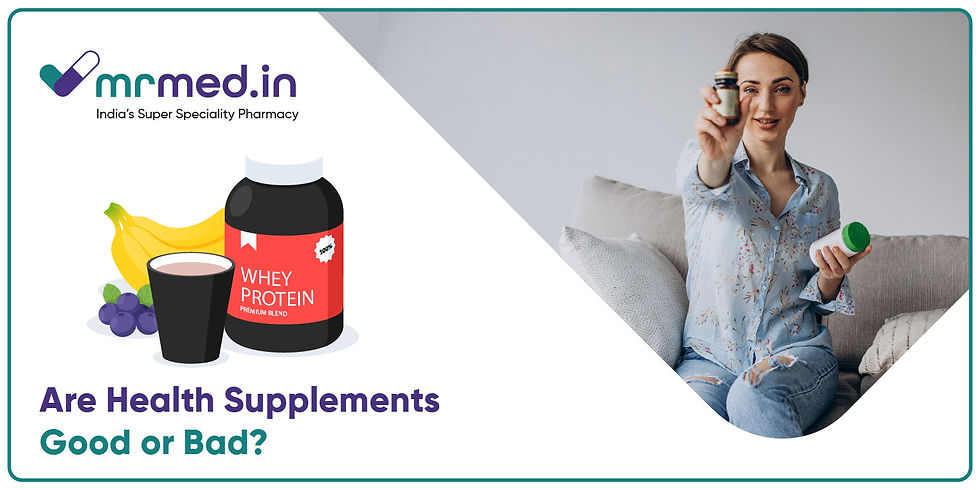The Pros and Cons of Health Supplements: Should You Take Them?
- Healthcare Tips

- Nov 2, 2024
- 4 min read

In today's health-conscious society, many people are seeking quick and easy ways to enhance their well-being. One of the most popular shortcuts is turning to health supplements. From vitamins to protein powders, the shelves are packed with products promising to improve your immune system, increase energy levels, or help with overall wellness. But do you really need them? Are these supplements safe and effective, or are they just marketing hype? In this article, let’s understand the pros and cons of health supplements.
Why do people take health supplements?
Health supplements have become a common part of daily life for many people. But what’s driving this trend? Some take them to fill nutritional gaps in their diets, while others believe they can prevent or treat certain health conditions. For example, many people with a weak immune system turn to supplements like Vitamin D3 to strengthen their body's defences. Others might use specialised supplements such as Celevida EN Vanilla Powder to manage specific dietary needs.
But does everyone really need to take these products? Let’s break it down by looking at both the benefits and drawbacks.
What are the benefits of taking health supplements?
1. Fills Nutritional Gaps
Even with a balanced meal, it can sometimes be hard to get all the nutrients you need from food alone. This is where supplements step in. They can fill any gaps by providing essential vitamins and minerals. For instance, people who don’t get enough sunlight may lack Vitamin D, and taking Vitamin D3 supplements can help maintain healthy bones and boost your immune system.
2. Supports Specific Health Goals
Some supplements are meant to support specific health conditions. For example, omega-3 supplements are often recommended for heart health, while calcium supplements can help prevent osteoporosis. For those with a weak immune system, taking the right supplements can help improve immune function and overall health.
3. Convenience
Let’s face it – life is busy, and planning balanced meals every day isn't always possible. Health supplements offer a convenient solution for people who struggle to eat a variety of nutritious foods regularly. Whether it’s a busy workday or a hectic travel schedule, taking supplements can ensure you’re still getting essential nutrients.
Are there any risks to taking health supplements?
While health supplements have their benefits, they also come with potential risks. It’s important to be aware of these drawbacks before you decide to incorporate them into your routine.
1. Overconsumption and Toxicity
More isn't always better. Taking higher doses of certain vitamins & minerals can be toxic and harmful to your health. For example, too much Vitamin D can lead to calcium buildup in the blood, causing nausea, weakness, and even kidney damage. It’s necessary to follow the recommended dose and consult a doctor before starting any supplement.
2. False Promises
The supplement industry isn’t as strictly regulated as prescription medications. This means some products might not live up to their claims. Many supplements are marketed as "miracle cures," but scientific evidence often doesn’t back these claims. Be aware of products that promise unrealistic results, such as rapid weight loss or instant muscle gain.
3. Potential Interactions with Medications
If you’re taking prescription medications, it’s essential to know that some supplements can interact with them. For example, certain supplements might reduce the effectiveness of your medication or, worse, cause harmful side effects. Always consult with a healthcare provider if you’re considering adding supplements to your routine, especially if you’re on any medications.
How do you choose the right health supplements?
Here are some tips to help you make an informed decision:
1. Assess Your Needs
Start by understanding what your body actually needs. Are you lacking specific nutrients, or are you looking to improve your overall health? For example, if you’re concerned about a weak immune system, you might consider supplements known to boost immune health, such as Vitamin D3 or zinc.
2. Check for Quality
Not all supplements are created equal. Look for products that are tested by third parties for purity and potency. This will help ensure you’re getting what’s listed on the label and that the product is free from harmful contaminants.
3. Consult with a Healthcare Professional
Before starting any supplement, it’s a good idea to talk to a healthcare provider. They can help you determine if you actually need supplements and recommend the best options based on your health status and lifestyle.
Is it safe to take health supplements long term?
Taking health supplements long-term can be beneficial, but it’s not always necessary or safe for everyone. Some supplements, like Vitamin D3, might be required long-term if you have specific deficiencies. However, for most people, it’s best to reassess your needs with a healthcare provider regularly. Over-reliance on supplements can sometimes mask underlying health issues or lead to nutrient imbalances.
Final thoughts
Incorporating health supplements into your lifestyle can be beneficial, but they’re not a one-size-fits-all solution. While they can fill nutritional gaps and support certain health goals, they also come with potential risks, especially if not used properly. Always remember that supplements are meant to supplement a healthy lifestyle, not replace one. A balanced meal, regular exercise, and good sleep should always be your first line of defence for maintaining good health. Consult with a healthcare professional to see if supplements are the right choice for you.
Comments